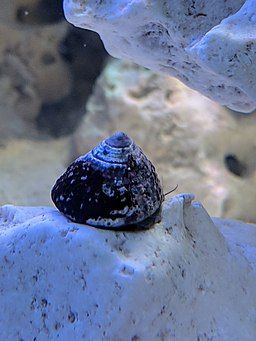[ad_1]
We spend a lot of time, energy, and money in this hobby to create and maintain the proper aquarium conditions to keep our fish and corals happy. It just turns out that those conditions are also generally quite good at growing algae. Adding one or more of these interesting invertebrates for your clean-up crew that eat algae can make all the difference in keeping the scales tipped in favor of your prized corals. Aquarium algae are not inherently bad and problematic, but sometimes they can flourish and spread when the delicate balance tips in their favor.
Crabs
Not all crabs are great at eating algae, but there are a few very popular varieties. Crabs are nimble and can climb and reach into tiny crevices that other creatures won’t get to. If you’re looking for an invertebrate to add to your clean-up crew that eats algae, check out the hermit crabs, Sally Lightfoot, and Emerald crabs.
Hermit Crabs

Hermit crabs are a valuable and efficient member of the clean-up crew
Sally Lightfoot Crab
Emerald or Mithrax Crab

The emerald crab is a fantastic algae-eater
Pods
You almost can’t go wrong with ‘pods. There are all sorts of different copepods and amphipods on the market. The best part is that they become a tasty living food for the planktivores in your tank as well. Having a stable population of pods in your tank is a hallmark of a healthy system.
Amphipods
Copepods
Your fish will go cuckoo for copepods…and they will help keep your tank clean.
Snails/Mollusks
Slow and steady wins the race when it comes to staying on top of aquarium algae–and the snails are a diverse group of invertebrates that eat algae with zeal! It’s a slow, plodding zeal by our eyes, but trust me, to them, it’s zeal. Check out the chiton, fighting conch, trochus, cerith, stomatella, bumblebee, and limpets.
Chiton
Fighting conch
Trochus
Cerith

A popular and effective clean-up crew member
Stomatella
Limpet
Bumblebee
Other great snails
There are a lot of truly great snail species available at local fish stores and online. Three other options to consider are Mexican turbo, Astraea, and Nerite snails.
Stars/Urchins
The tube-footed echinoderms are popular among aquarium owners because they are just irresistible to watch. Observing these ancient creatures move about just has a degree of mystique about it. Several commonly available species for the home aquarium include the chocolate chip starfish, serpent sea star, sand-sifting starfish, Diadema urchin, and tuxedo urchin.
Just don’t keep them in the same tank as a Harlequin shrimp. That is no bueno for the starfish.
Chocolate chip
Serpent
Sand-sifting
Diadema urchin
The Diadema sea urchin is a voracious algae-eater member of the clean-up crew. But they come with two important caveats. Watch out, they will also eat coralline algae. They have the nickname bulldozers because they will dislodge your corals in the process.
Tuxedo Urchin
Slugs/Hares/Cucumbers
Sea slugs and cucumbers are perhaps the most efficient algae-eaters on this list. They are often so efficient at eating the aquarium algae that they starve. These invertebrates also come with one other warning to watch out for ‘inking,’ a defense mechanism that can end up causing big problems if it happens in your tank. You may see three commonly available animals at your local fish store: the Aplysia sea slug, lettuce sea slug, and the sea apple, which is actually a cucumber. I just love all the funny fruit and vegetable names.
Aplysia
Lettuce
Sea apple

Sea apple
Conclusions
As you can see, our reefs are teeming with great examples of interesting invertebrates for your clean-up crew that eat algae. Your biggest challenge is deciding which ones you will plan to add to your saltwater aquarium.
What to read next
Check out these other great articles:
[ad_2]
Source link
















